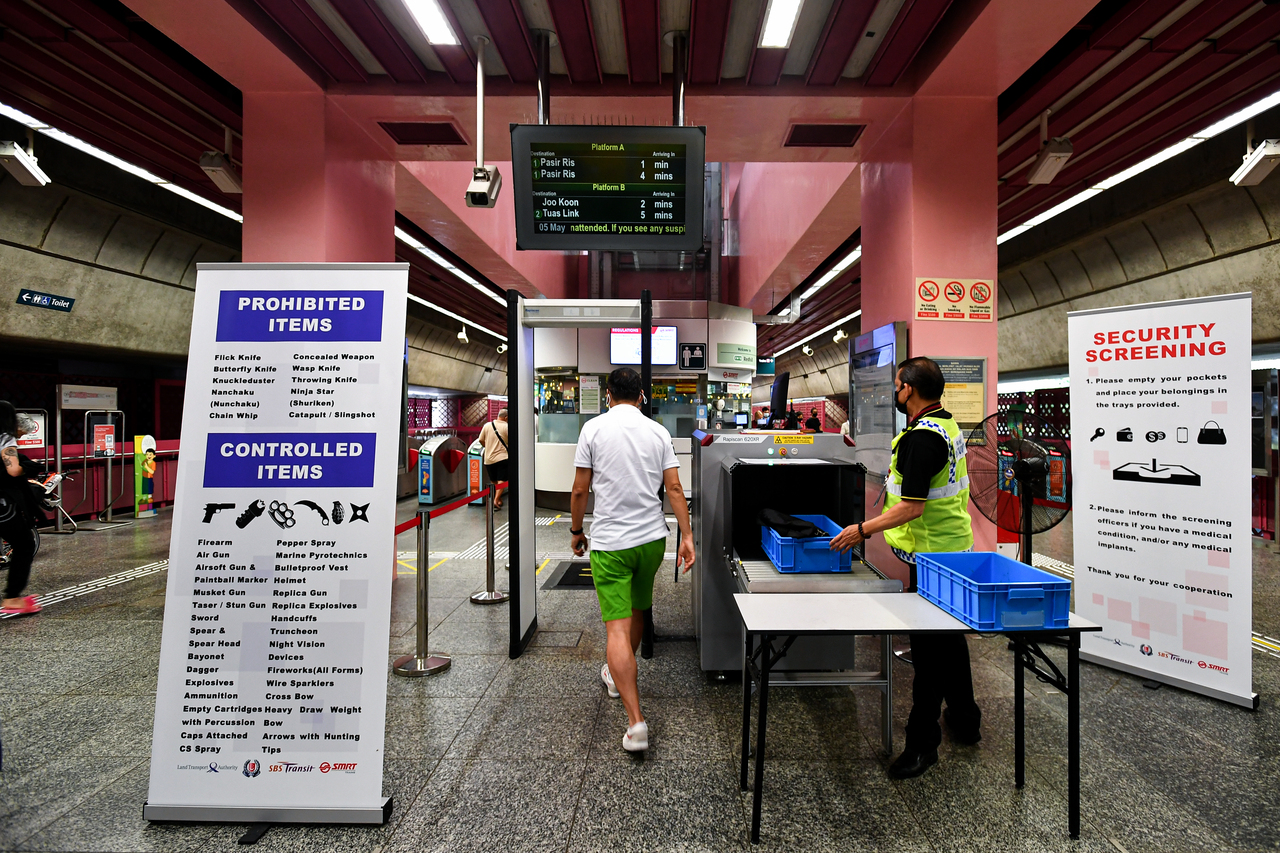Frisk searches on commuters will be done only in areas where there is video surveillance: Khor
Sign up now: Get ST's newsletters delivered to your inbox

Security screening being conducted at Redhill MRT station on May 5, 2021.
ST PHOTO: LIM YAOHUI
SINGAPORE - Frisk searches conducted on public transport commuters will be done only in areas where there is video surveillance, and only authorised female officers can conduct searches on a female person.
All authorised officers conducting frisk searches have to be in uniform and they will also need to undergo the requisite training before they are deployed, Senior Minister of State for Transport Amy Khor told Parliament on Tuesday (May 11), as she sought to allay concerns among MPs that new laws passed could be abused or lead to racial profiling.
Police officers who are not in uniform will also have to first identify themselves.
Dr Khor was speaking during the debate on amendments to the Road Traffic Act and other laws that will give police officers and authorised personnel broader powers to screen and search commuters.
While she did not specify how those steps would be ensured, Dr Khor said: "Our authorised officers have a duty, responsibility and obligation to ensure that they do this in accordance to protocols."
The new laws allow security checks to be carried out at designated entrances of bus interchanges, before fare gates at MRT and LRT stations, or any parts of these transport nodes.
If necessary, checks can also be carried out on board buses and trains.
Under the new laws, a frisk search is conducted by quickly running one's hands over an individual's outer clothing. Only police officers or "senior approved persons" will be given powers to conduct such searches.
Senior personnel are auxiliary police officers, security officers engaged by bus or rail operators, and outsourced enforcement officers appointed by the Land Transport Authority.
Those who refuse to be screened may be asked to leave the bus, train, interchange or station. Refusing or failing to comply with requests or orders without a reasonable excuse is an offence that carries a fine of up to $1,000.
Dr Khor said the security searches conducted on commuters would be similar to those carried out at major events, such as the National Day Parade.
Authorised officers who conduct these searches must complete the necessary Workforce Skills Qualification courses, which are approved by the Singapore Police Force.
During this training, officers are taught how to spot individuals displaying suspicious behaviour without bias against any race or religion, she added.
It is only after completing the training and certification that these officers can be considered "senior approved persons" as defined in the new law.
Saying she appreciated that search powers had to be expanded given the evolving security situation and the threat from self-radicalisation, Workers' Party chairman Sylvia Lim (Aljunied GRC) asked if it was appropriate for security officers outside the police force to search commuters, given the vastly different levels of training.
"A bodily search is an intimate security check which should only be performed by highly-trained persons," she said. "Do they have the requisite training, not only on how to perform the physical act, but also to handle any confrontations that may arise?"
Ms He Ting Ru (Sengkang GRC) said adequate training must be given in order to prevent abuses such as excessive enforcement, harassment, or even sexual assault.
Ms Raeesah Khan (Sengkang GRC), Mr Saktiandi Supaat (Bishan-Toa Payoh GRC) and Nominated MP Shahira Abdullah warned that improper frisk searches could also lead to perceptions of racial profiling and bias.
"There must also be set protocol and adequate infrastructure for the searches carried out by officers to be done in a dignified and respectful manner," said Dr Shahira.
Ms Lim asked Dr Khor whether the Government would be enshrining these protocols in law. Meanwhile, Ms Khan suggested statistics on the frisk searches conducted be published, broken down by gender, ethnicity, time, location and justification.
She also called for public education campaigns so that commuters know if officers searching them are behaving appropriately.
Mr Saktiandi asked how the safety of the public and of the officers conducting searches can be guaranteed amid the ongoing pandemic. In response, Dr Khor said authorised officers will be required to adhere strictly to safe management measures.
They are reminded to practise good personal hygiene, and all security equipment are regularly sanitised after each use.


